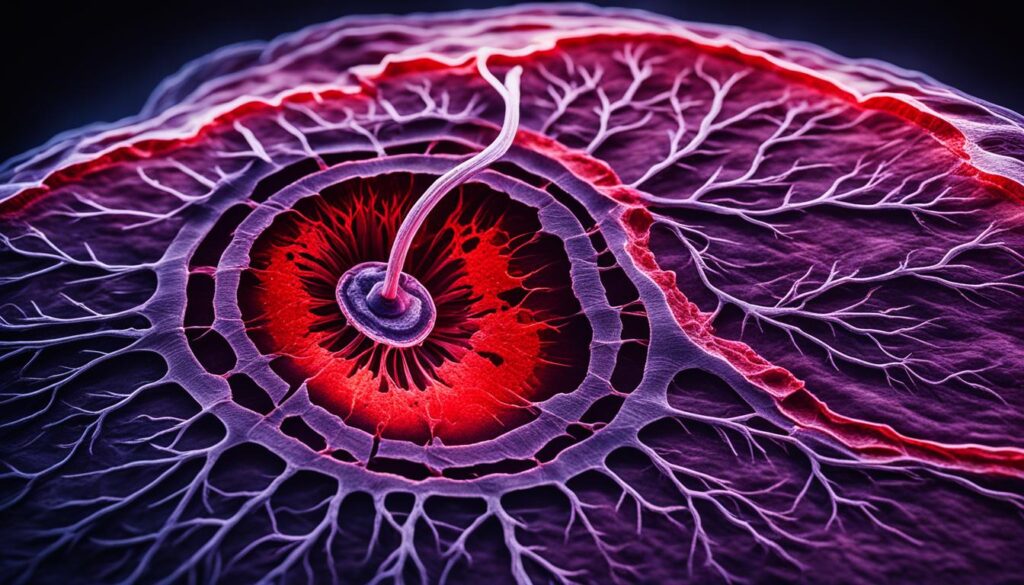Did you know that over 50% of individuals who are 75 years old or older suffer from kidney disease? The influence of aging on kidney health is substantial, and comprehending this correlation is essential for preserving renal function as we age. This article delves into the link between aging and kidney disease, the impact of aging on kidney function, prevalent kidney problems in older adults, risk factors for kidney disease in the elderly, preventative measures, and insights from scholarly research on aging and the kidney.
As we age, it becomes increasingly important to prioritize our kidney health. Let’s dive deeper into the topic and discover how we can take proactive steps to care for our kidneys as we grow older.
Key Takeaways:
- Aging is a significant risk factor for kidney disease, with over 50% of seniors over the age of 75 having kidney disease.
- As people age, their kidneys gradually lose function, leading to a decreased ability to filter waste products and maintain fluid and electrolyte balance.
- Older adults may be more prone to kidney conditions such as urinary tract infections (UTIs) and kidney stones.
- Several risk factors, including high blood pressure, diabetes, and a family history of kidney failure, can increase the likelihood of developing kidney disease in older adults.
- Maintaining a healthy lifestyle, managing underlying health conditions, and regular screenings can help prevent and mitigate the risk of kidney disease in aging adults.
Let’s explore the impact of aging on kidney health in more detail and learn how we can protect and preserve our renal function as we age.
Source: National Institute of Diabetes and Digestive and Kidney Diseases
Understanding Kidney Disease and Aging
As we age, the risk of developing kidney disease increases. Although kidney disease can affect individuals of any age, aging is recognized as a significant risk factor. The exact causes of age-related kidney disease are not fully understood; however, several factors may contribute to its development.
One of the primary factors is the gradual loss of kidney function that occurs with aging. The kidneys play a crucial role in filtering waste products and maintaining fluid and electrolyte balance in the body. Over time, the kidneys may become less efficient, which can lead to the accumulation of toxins and imbalances in the body.
In addition to age-related changes in kidney function, the presence of other health conditions can further increase the risk of kidney disease in older adults. Conditions such as diabetes and high blood pressure are commonly associated with kidney disease and often coexist with aging.
“Aging is recognized as a significant risk factor for kidney disease.”
“The kidneys play a crucial role in filtering waste products and maintaining fluid and electrolyte balance in the body.”
Research suggests that age-related kidney disease may also be influenced by genetic factors and lifestyle choices. Family history can contribute to an individual’s predisposition to kidney disease. Additionally, certain behaviors, such as smoking and excessive alcohol consumption, can further compromise kidney function.
Understanding the complex relationship between aging and kidney disease is essential for early detection, prevention, and management. By recognizing the risk factors associated with age-related kidney disease, individuals can take proactive steps to protect their kidney health.
Age-Related Kidney Disease Risk Factors
| Risk Factors | Explanation |
|---|---|
| Gradual loss of kidney function | Aging leads to a natural decline in kidney function, making individuals more susceptible to kidney disease. |
| Presence of other health conditions | Chronic conditions like diabetes and high blood pressure can increase the risk of kidney disease in older adults. |
| Genetic factors | Family history of kidney disease can contribute to an individual’s likelihood of developing age-related kidney disease. |
| Lifestyle choices | Behaviors such as smoking and excessive alcohol consumption can further impair kidney function. |
By addressing these risk factors and adopting a healthy lifestyle, older adults can mitigate their chances of developing kidney disease. Regular screenings, managing chronic conditions, and maintaining a balanced diet can all contribute to maintaining optimal kidney health.
Next, we will explore the impact of aging on renal function and discuss common kidney conditions that affect older adults.
The Impact of Aging on Renal Function
As people age, their kidneys gradually lose function. This can lead to a decreased ability to filter waste products from the blood and maintain fluid and electrolyte balance. Age-related changes in the kidneys include a decrease in the number and size of functioning nephrons, reduced blood flow to the kidneys, and alterations in the renin-angiotensin system, which regulates blood pressure.
Aging can have a significant impact on renal function, affecting the kidneys’ ability to perform essential tasks in the body. The gradual decline in kidney function can result in several effects, such as:
- Impaired waste filtration: With aging, the kidneys may become less efficient at removing waste products from the blood, leading to the accumulation of toxins in the body.
- Fluid and electrolyte imbalances: As renal function declines, the kidneys may struggle to maintain the proper balance of fluids and electrolytes, potentially causing issues like dehydration and electrolyte abnormalities.
- Changes in blood pressure regulation: The renin-angiotensin system, which plays a crucial role in regulating blood pressure, may be altered in the aging kidneys. This can contribute to hypertension and other cardiovascular complications.
- Reduced drug clearance: Age-related changes in renal function can affect the clearance of medications from the body, increasing the risk of drug toxicity or adverse reactions.
It is important to understand the impact of aging on renal function to promote kidney health and identify potential risks or complications. Regular monitoring of kidney function through blood tests and consultation with healthcare professionals can help in the early detection and management of age-related kidney issues.
Age-Related Changes in the Kidneys
“The kidneys undergo various changes as we age, affecting their ability to function optimally. These changes include a decrease in the number and size of functioning nephrons and alterations in the renin-angiotensin system, among others.”
Common Kidney Conditions in Older Adults
As we age, our bodies become more susceptible to certain kidney conditions. In older adults, two common kidney conditions are urinary tract infections (UTIs) and kidney stones.
Urinary Tract Infections (UTIs): UTIs occur when bacteria enter the urinary system and multiply, causing infection. Older adults may experience symptoms such as pain or a burning sensation during urination, frequent urination, blood in the urine, or cloudy urine. If left untreated, UTIs can lead to more severe complications, such as kidney infection or sepsis.
Kidney Stones: Kidney stones are hard mineral and salt deposits that form in the kidneys. They can cause severe pain when they pass through the urinary tract. Older adults may experience symptoms such as sudden and intense back or abdominal pain, blood in the urine, or frequent urination. Kidney stones can obstruct the flow of urine and increase the risk of urinary tract infections.
If you or a loved one are experiencing symptoms of a UTI or kidney stones, it is essential to seek medical attention. Early detection and treatment can help prevent complications and ensure proper management.
| Kidney Condition | Symptoms |
|---|---|
| Urinary Tract Infections (UTIs) | Pain or burning during urination Frequent urination Blood in the urine Cloudy urine |
| Kidney Stones | Sudden and intense back or abdominal pain Blood in the urine Frequent urination |

Risk Factors for Kidney Disease in Aging Population
As we age, the risk of developing kidney disease increases. Several factors contribute to this heightened risk, including:
- High blood pressure: Hypertension is a leading risk factor for kidney disease. The kidneys play a crucial role in regulating blood pressure, so when it remains high over a prolonged period, it can significantly damage these organs.
- Diabetes: Individuals with diabetes are at a higher risk of developing kidney disease. Persistently high blood sugar levels can damage the kidneys’ filtering units, impairing their ability to remove waste and excess fluids from the body.
- Family history of kidney failure: A family history of kidney failure can increase the likelihood of developing kidney disease. Genetic factors may predispose certain individuals to inherit kidney-related conditions, making them more susceptible to renal issues as they age.
- Lifestyle factors: Certain lifestyle choices can also increase the risk of kidney disease in older adults. Smoking and excessive use of over-the-counter pain medications, such as nonsteroidal anti-inflammatory drugs (NSAIDs), have been associated with kidney damage.
It is crucial for older adults to remain aware of these risk factors and take proactive steps to reduce their likelihood of developing kidney disease. Regular screenings for high blood pressure and diabetes, as well as making lifestyle changes to prioritize kidney health, can help mitigate the risk.
By managing blood pressure, blood sugar levels, and adopting a healthy lifestyle, older adults can safeguard their kidney function and promote optimal renal health.
Preventing Kidney Disease in Aging Adults
As we age, it’s important to take proactive steps to prevent kidney disease and maintain optimal kidney health. By adopting a healthy lifestyle and following these preventive measures, we can reduce the risk of kidney disease in aging adults.
Maintain a Healthy Lifestyle
A healthy lifestyle plays a crucial role in preventing kidney disease. Regular exercise, such as brisk walking or swimming, can improve overall health and reduce the risk of chronic conditions that can affect kidney health, such as high blood pressure and diabetes. Aim for at least 30 minutes of moderate-intensity exercise most days of the week.
“Exercise is not only beneficial for our overall well-being but can also have a positive impact on kidney health. It helps maintain healthy blood pressure levels and improves cardiovascular health, which are important factors in preventing kidney disease.”
In addition to exercise, following a balanced diet is essential. Include a variety of fruits, vegetables, whole grains, lean proteins, and low-fat dairy products in your meals. Limit sodium intake to help manage blood pressure and choose foods lower in phosphorus and potassium if advised by your healthcare provider.
Manage Blood Pressure and Blood Sugar Levels
High blood pressure and diabetes are leading causes of kidney disease. It’s important to monitor and manage these conditions to prevent kidney damage. Take prescribed medications as directed, follow a healthy diet, exercise regularly, and avoid smoking to help keep these conditions under control.
Stay Hydrated
Proper hydration is crucial for kidney health. Drinking an adequate amount of water helps flush out toxins and waste products from the body. Aim to drink at least eight glasses of water per day, or more if advised by your healthcare provider.
Avoid Excessive Use of Medications
Certain medications, such as non-steroidal anti-inflammatory drugs (NSAIDs), can harm the kidneys when used excessively or for prolonged periods. Talk to your healthcare provider before taking any over-the-counter medications, especially if you have existing kidney problems or are taking other medications that may interact.
Regular Screening for Kidney Disease
Regular screening is essential to detect kidney disease early, especially in aging adults who may be at higher risk. Annual kidney function tests, such as blood and urine tests, can help identify any signs of kidney dysfunction. Consult with your healthcare provider to determine the appropriate screening frequency based on your individual risk factors.

Taking preventive measures and making lifestyle changes can significantly reduce the risk of kidney disease in aging adults. By prioritizing our kidney health, we can promote overall well-being and enjoy a higher quality of life as we age.
The Role of Aging in Acute Kidney Injury
Aging plays a significant role in the development of acute kidney injury (AKI). AKI refers to a sudden decline in kidney function and can have serious consequences for older adults. The aging process leads to changes in kidney function, making older individuals more susceptible to AKI. Additionally, the prevalence of other health conditions, such as diabetes and high blood pressure, which are risk factors for AKI, tends to increase with age.
Age-related changes in kidney function can impact the kidneys’ ability to filter waste products from the blood and maintain fluid and electrolyte balance. These changes may include a decrease in the number and size of functioning nephrons, reduced blood flow to the kidneys, and alterations in the renin-angiotensin system, which regulates blood pressure.
In older adults, these age-related changes can make the kidneys more vulnerable to injury and less capable of recovering from insult, increasing the risk of developing AKI. Additionally, the presence of other health conditions that commonly occur in older adults, such as cardiovascular disease or the use of certain medications, can further contribute to AKI.
It’s crucial for healthcare professionals to be aware of the increased risk of AKI in aging adults and take appropriate measures to prevent, detect, and manage this condition. Early recognition and intervention are essential in minimizing the impact of AKI and improving outcomes for older adults.

Statistics on Acute Kidney Injury in Aging Adults:
| Age Group | Prevalence of AKI |
|---|---|
| 60-74 years | 20-30% |
| 75+ years | 30-40% |
These statistics highlight the substantial impact of aging on the occurrence of AKI. As individuals age, their risk of developing AKI increases significantly, underscoring the importance of proactive care and prevention strategies in managing kidney health in the aging population.
The Link Between Aging and Chronic Kidney Disease
Chronic kidney disease (CKD) is a progressive condition characterized by the gradual loss of kidney function over time. Aging is a significant risk factor for the development and progression of CKD. As people age, their kidneys become less efficient at filtering waste products and maintaining fluid balance, making them more susceptible to CKD.
Aging-related changes in the kidneys, such as a decrease in the number and size of functioning nephrons, reduced blood flow to the kidneys, and alterations in the renin-angiotensin system, can contribute to the development and progression of CKD.

The Link Between Aging and CKD: Key Points
- As people age, their kidneys become less efficient at filtering waste products and maintaining fluid balance, increasing the risk of CKD.
- Aging-related changes in the kidneys, including a decrease in the number and size of functioning nephrons, reduced blood flow, and alterations in the renin-angiotensin system, contribute to the development and progression of CKD.
Understanding the link between aging and CKD is crucial for early detection, prevention, and management of kidney disease in the aging population. Regular screenings, maintaining a healthy lifestyle, and managing underlying health conditions can help optimize kidney health and reduce the risk of CKD.
Comprehensive Infochart for Chronic Kidney Disease (CKD)
Chronic Kidney Disease (CKD)
- What is CKD?
- A progressive condition where the kidneys gradually lose their ability to filter waste and excess fluids from the blood.
- Develops over months or years.
- Causes
- Top two causes:
- Diabetes
- High blood pressure (hypertension)
- Other causes:
- Glomerulonephritis (inflammation of the kidney’s filters)
- Polycystic kidney disease (inherited)
- Long-term use of certain medications
- Top two causes:
- Symptoms
- Often no symptoms in early stages
- Later stages may include:
- Fatigue
- Swelling in feet, ankles, or around the eyes
- Loss of appetite
- Nausea and vomiting
- Itching
- Trouble sleeping
- Shortness of breath
- Stages of CKD
- 5 stages based on kidney function (measured by GFR)
- Stage 1: Mild kidney damage
- Stage 2: Mildly reduced kidney function
- Stage 3: Moderately reduced kidney function
- Stage 4: Severely reduced kidney function
- Stage 5: Kidney Failure (end-stage renal disease)
- 5 stages based on kidney function (measured by GFR)
- Risk Factors
- Age (over 60)
- Diabetes
- High blood pressure
- Family history of kidney disease
- Cardiovascular disease
- Obesity
- Complications
- Heart disease
- Anemia
- Weak bones
- Fluid buildup
- Nerve damage
- Increased risk of infections
- Prevention
- Manage diabetes and high blood pressure
- Healthy diet and exercise
- Maintain a healthy weight
- Avoid smoking
- Limit alcohol intake
- Regular checkups with your doctor
- Treatment
- Focus on slowing disease progression and managing complications
- Medications for blood pressure, blood sugar, complications
- Dietary changes (restricting salt, protein, etc.)
- Dialysis or kidney transplant in severe cases
Important Note: CKD is often called a “silent” disease because many people show no symptoms in the early stages. Regular checkups are essential for early detection and effective management.
| Key Points | Actions to Take |
|---|---|
| Aging is a significant risk factor for CKD. | Regular screenings for kidney disease |
| Aging-related changes in the kidneys contribute to CKD. | Maintain a healthy lifestyle |
| Early detection and management are crucial. | Manage underlying health conditions |
Understanding the Aging Kidney: Insights from Research
Scientific research has provided valuable insights into the effects of aging on kidney function. Studies have revealed age-related changes in renal hemodynamics, glomerular structure, and the nitric oxide system. These changes play a crucial role in the gradual decline of renal function and increase the risk of kidney disease among the aging population.
Research on aging and the kidney has shown that renal hemodynamics, which involve the blood flow and pressure within the kidneys, undergo alterations as a person ages. This can impact the efficiency of the kidneys in filtering waste products from the blood and maintaining fluid balance. Age-related changes in renal hemodynamics contribute to the reduced ability of the kidneys to perform their vital functions.
“Age-related changes in renal hemodynamics can significantly impact kidney function, potentially leading to the development of kidney disease in older adults.”
Furthermore, studies have revealed age-related structural changes within the glomeruli, the microscopic units responsible for filtering blood in the kidneys. These changes include alterations in the size and number of glomeruli, which can further impair renal function. The gradual loss of glomeruli with age is a significant contributor to decreased kidney function over time.
“Age-related alterations in glomerular structure can compromise the kidney’s ability to effectively filter waste products from the blood, increasing the risk of kidney disease in the aging population.”
The nitric oxide system, which regulates blood vessel dilation and constriction, also undergoes changes with age. Research has shown that the nitric oxide system plays a crucial role in maintaining renal blood flow and overall kidney function. Age-related alterations in this system can lead to decreased blood flow to the kidneys and impaired kidney function.
“Dysfunction of the nitric oxide system due to aging can contribute to reduced renal blood flow and impaired kidney function, increasing the susceptibility to kidney disease.”
Insights from Research on Aging and the Kidney
| Research Area | Findings |
|---|---|
| Renal Hemodynamics | Alterations in blood flow and pressure within the kidneys contribute to reduced renal function and increased risk of kidney disease in older adults. |
| Glomerular Structure | Age-related changes in the size and number of glomeruli compromise the kidney’s ability to effectively filter waste products, leading to a higher risk of kidney disease. |
| Nitric Oxide System | Age-related dysfunction of the nitric oxide system impairs renal blood flow and overall kidney function, increasing susceptibility to kidney disease. |
These insights from research shed light on the complex relationship between aging and kidney function. By understanding the underlying mechanisms involved, we can develop strategies for early detection, prevention, and management of kidney disease in the aging population.

Conclusion
Aging can have a significant impact on kidney health, increasing the risk of kidney disease and other renal conditions. As we age, our kidneys gradually lose function, making it crucial for us to take proactive steps to care for our kidneys and optimize their health.
Regular screenings are essential in detecting kidney disease early on, especially for individuals over the age of 60 and those in high-risk groups. By identifying kidney disease in its early stages, we can implement preventive measures and interventions to slow its progression.
Maintaining a healthy lifestyle is also vital for optimal renal health. This includes following a balanced diet, engaging in regular physical activity, managing blood pressure and blood sugar levels, and staying hydrated. Avoiding excessive use of medications that can harm the kidneys is also important.
In conclusion, as we age, it is crucial for us to prioritize our kidney health through preventive care and lifestyle choices. By doing so, we can reduce the risk of kidney disease and other renal conditions, leading to a better quality of life as we grow older.
FAQ
Is there a link between aging and kidney disease?
Yes, aging can impact kidney function and increase the risk of developing kidney disease. People over the age of 60 are more likely to have kidney disease, with estimates suggesting that over 50% of seniors over the age of 75 have kidney disease.
What are the causes of kidney disease in older adults?
The exact causes of age-related kidney disease are not fully understood, but factors such as the gradual loss of kidney function and the presence of other health conditions, like diabetes and high blood pressure, may contribute.
How does aging affect renal function?
As people age, their kidneys gradually lose function. This can lead to a decreased ability to filter waste products from the blood and maintain fluid and electrolyte balance. Age-related changes in the kidneys include a decrease in the number and size of functioning nephrons, reduced blood flow to the kidneys, and alterations in the renin-angiotensin system, which regulates blood pressure.
What are some common kidney conditions in older adults?
Older adults may be more prone to urinary tract infections (UTIs) and kidney stones. UTIs can cause symptoms like pain and frequent urination, while kidney stones can lead to severe pain and obstruction of urine flow.
What are the risk factors for kidney disease in older adults?
Several risk factors can increase the likelihood of developing kidney disease in older adults, including high blood pressure, diabetes, a family history of kidney failure, and certain lifestyle factors like smoking and excessive use of over-the-counter pain medications.
How can kidney disease be prevented in aging adults?
Preventive measures include maintaining a healthy lifestyle with regular exercise, following a balanced diet, managing blood pressure and blood sugar levels, staying hydrated, and avoiding excessive use of medications that can harm the kidneys. Regular screening for kidney disease is also recommended.
What is the link between aging and acute kidney injury?
Aging is a known risk factor for acute kidney injury (AKI), which is a sudden loss of kidney function. Older adults may be more susceptible to AKI due to age-related changes in kidney function and a higher likelihood of developing other health conditions that can contribute to kidney injury.
How does aging contribute to chronic kidney disease?
Aging is a significant risk factor for the development and progression of chronic kidney disease (CKD). As people age, their kidneys become less efficient at filtering waste products and maintaining fluid balance, making them more susceptible to CKD.
What does research say about the aging kidney?
Scientific research has provided insights into the aging process of the kidneys, showing age-related changes in renal hemodynamics, glomerular structure, and the nitric oxide system. These changes can contribute to reduced renal function and an increased risk of kidney disease in the aging population.
How can aging adults care for their kidneys?
Aging adults can care for their kidneys by being proactive in their health. This includes understanding the risk factors for kidney disease, maintaining a healthy lifestyle, managing underlying health conditions, and seeking regular screenings for kidney disease.









